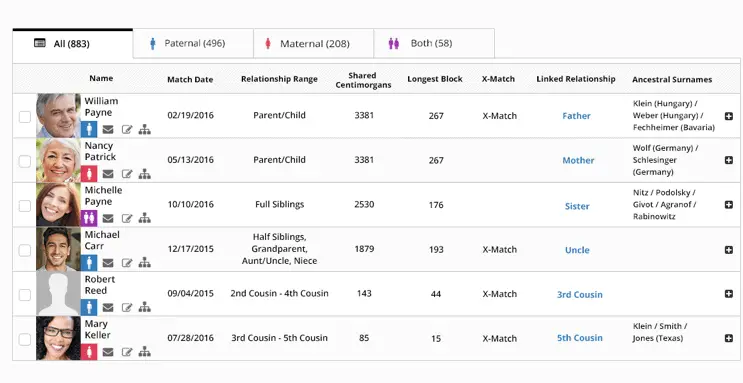
I use many DNA tests for genetic genealogy. But Family Finder is my personal favorite.
As an adoptee, I used certain DNA tests to discover and confirm the identity of my birth father.
As a genealogist, I continue to use several DNA tests to trace my family tree and that of my wife. But I make sure that every relative who tests anywhere gets into this key database.
Many people will learn the most about themselves and their families from these four autosomal DNA tests:
Family FinderAncestryDNA23andMeMyHeritage
Adoptees looking for birth families should do ALL of them. That will maximize your odds of finding a close genetic match that can solve your mystery quickly. Success can still be found through more distant cousin matches. But it is more difficult and time consuming.
For genealogists these tests are powerful tools for extending and confirming the various branches of your family trees. With all four companies now offering tests at less than $100 each, many who do one test will often decide to try others.
Family Finder Overview
This test shares one key strength will all the tests at Family Tree DNA. Virtually all your genetic matches will be identified by real name and have an email address to which you can write. With other tests, most matches will only display user names. And you must use an internal system to attempt contact.
Most users will be genealogists or adoptees looking for matches. They want to compare family trees. Even though an ethnic ancestry report is included with your results, you won’t encounter many matches who tested primarily for ethnic ancestry because of TV advertising.
Likewise, you won’t encounter matches who only tested for health reports, since Family Finder is not designed for that.
Best of all, Family Finder includes more useful tools for analyzing your genetic matches than any other test. These include the Chromosome Browser, In Common With and Not In Common With filters, the Matrix feature, and X-chromosome match reporting.
My favorite is the Family Matching Tool that helps sort your matches into paternal and maternal sides based on linked relationships you set with known family members. That’s a big reason I want all my close relatives to be here.

NOTE: This database is not as large as those of AncestryDNA and 23andMe, both of which do extensive television advertising. Yet an extremely generous data transfer program is causing rapid expansion.
The Autosomal DNA Transfer Program
If you already have results from another autosomal DNA test, you may be able to transfer into Family Finder for free. Currently, they support all AncestryDNA tests (Versions 1 and 2) and all 23andMe tests since November 2010 (Versions 3 and 4).
You will see a list of your genetic matches and get access to the Matrix tool for free. Results will usually appear within 24 hours.
Optionally, you can unlock all the features for just $19. This includes the Chromosome Browser, the myOrigins ethnic ancestry report, and the ancientOrigins report.
Transfers from MyHeritage test are expected to be added soon.
To do a transfer, follow this link, click DNA Tests in the upper left corner, and choose Autosomal Transfer.
Why You May Still Prefer to Test Directly
Family Tree DNA also offers many other tests, including Y-DNA and mitochondrial DNA testing. If you order a Family Finder test and provide a sample through the FTDNA test kit, they will keep your DNA for up to 25 years. That makes ordering additional tests easy and relatively quick, because there is no wait for sample shipment and return.
If you simply transfer in, they will only have DATA from one test type and NOT your DNA. You will have to submit a sample to do other tests.
NOTE: It is particularly important to collect and submit DNA from your older relatives, since they might not be around when you wish you do further testing.
Also, the most recent versions of AncestryDNA and 23andMe have shifted their data sets to include more medically significant areas. This means these transfer users will not have enough data in common with the direct testers to reliably identify more speculative matches.
This means you will get more matches by testing your DNA directly on Family Finder.
